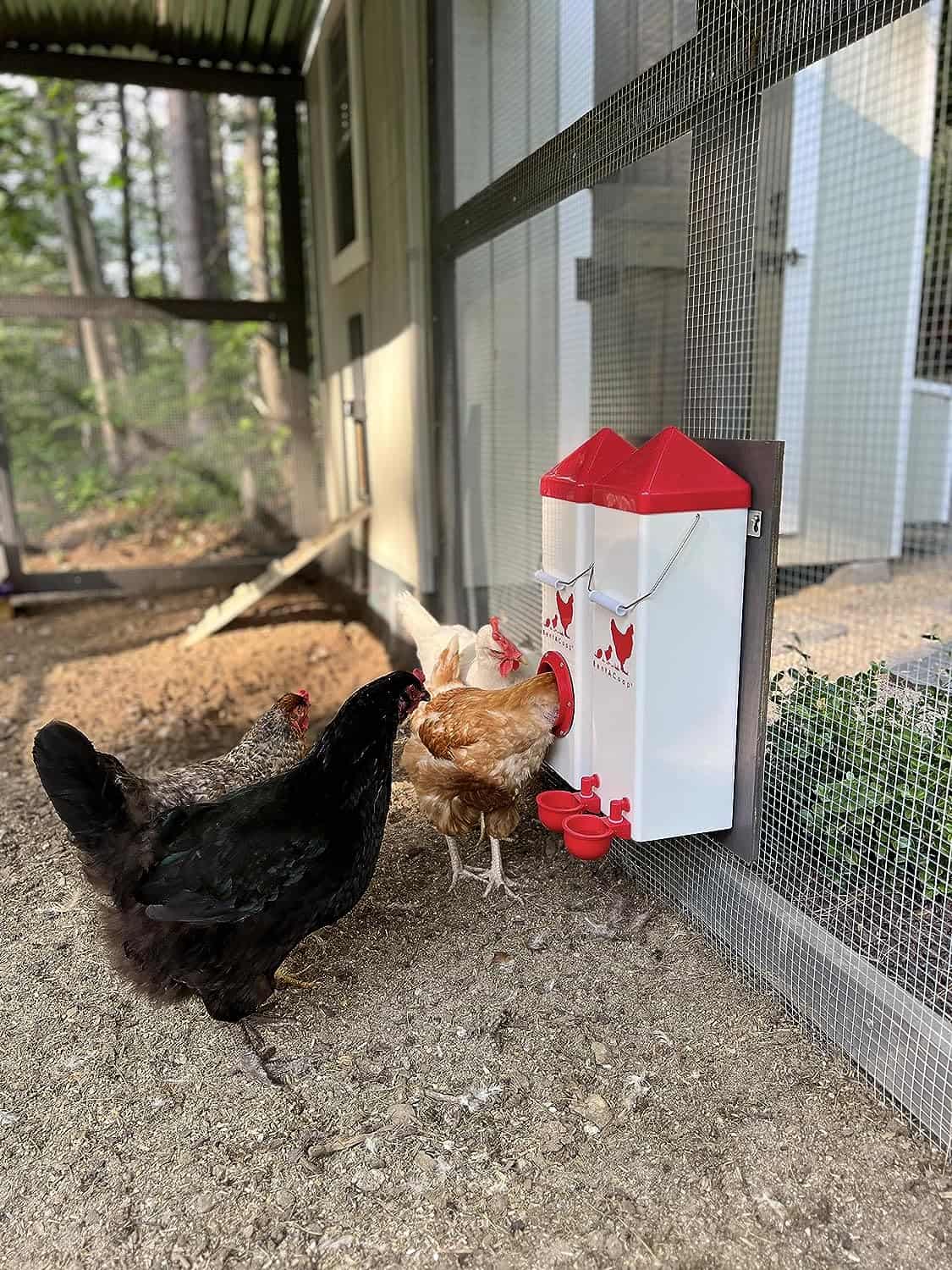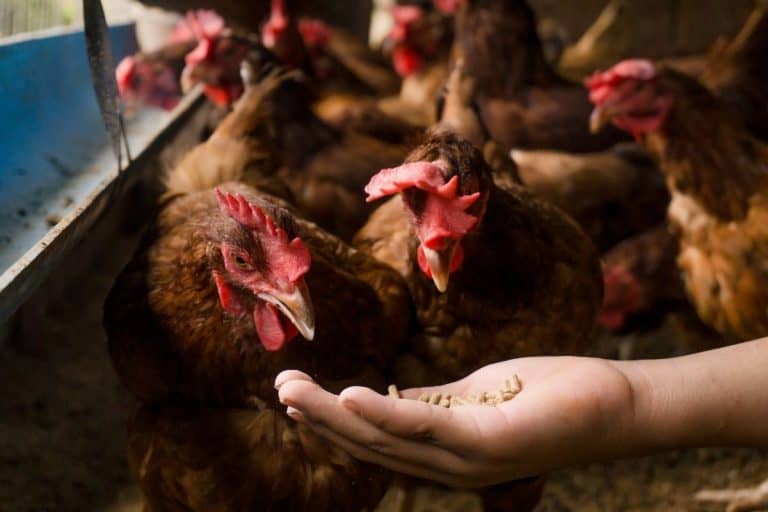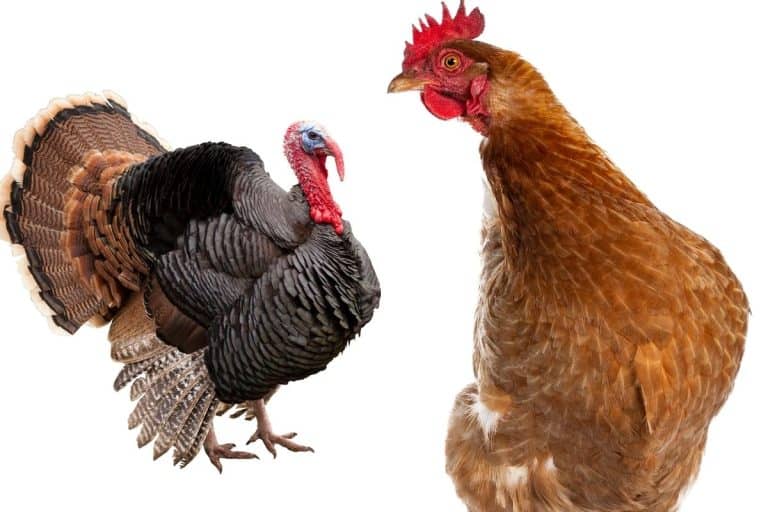Are Chickens Scared Of The Dark? (+ what to do about it)
If you’ve ever struggled to shoo your young chickens into the coop at night and felt like they were fighting you the whole way, it’s probably because their coop was too dark! You may be thinking that the chickens are just afraid of the dark, but the reality is they just have terrible night vision!
Chickens are afraid of the dark, not necessarily night time, but because they have even less night vision than humans.
There is a bit of science to explain why chickens seem afraid of the dark, such as the number of rods and cones in their eyes and their ancestral habitat. This species has evolved over time to adapt to many situations, but night vision is unfortunately not one of them. Keep reading to learn more about why our feathered friends are afraid of the dark!
But before you dive into this topic, did you know I've got a page packed with my go-to chicken stuff? From the best feed to handy tools, it's all there. Don't you want the best for your flock? Check it out right here.
Can Chickens See Well In The Dark?
Chickens cannot see well in the dark at all. They are effectively “night blind” once it is dark outside.
In order for us to understand why that is, we need to talk about the anatomy of the eye and how it works.
All vertebrates, such as mammals and birds, have two different types of light receptor cells in their eyeballs. These are called rods and cones.
Rods And Cones
Rods are light-sensitive photoreceptors, which is what allows for some animals to see in low-light situations. Cones are what allow for color vision in daylight or bright light.
So, how do we know how well chickens can see in the dark? Scientists have studied the internal structures of this species’ eyes, discovering that our feathered friends indeed have poor night vision due to the minimal number of rods in their eyes.

On the other hand, chickens have excellent color vision. Their eyes consist of more cones than humans have! Meaning that they can see a vibrancy of colors that we cannot.
Bird Fact: A lot of different species of birds have poor night vision. The few that are an exception to that are owls, whippoorwills, and some birds-of-prey like the hawk.
Ancestral Habitat
We speculate that colors became so important to the chicken species when the chicken ancestor, the male Red Jungle Fowl became so colorful. Much like the roosters we have today! These brightly colored boys would use their feathers to attract the attention of mates, which led to an evolution of primarily daytime dominant behaviors, therefore the chicken’s eyes adapted to bright light living.
The Jungle Fowl lived in their original home of Southeast Asia before they were domesticated by humans. Much like the chickens that we see today, they enjoy foraging for seeds, grain, bugs and other plants.
Still similar to the modern chicken, the Red Jungle Fowl would also fly up into the trees to roost far from the dangerous predators on the ground. Even in the dark, they were typically far enough out of reach unless the animal could climb or fly.

Wait, I have some recommendations for you!
Before you go any further, I want you to take a look at some of the recommendations I've handpicked for you. I think these are essential items you should have for your chickens flock. You can check them out and buy them directly from Amazon.
 |  |  |  |
| Essential accessory for your coop | No more tripping over hoses! | Predator protection made easy | Comfort + style is possible |
Should I Put A Nightlight In Their Chicken Coop?
Providing your chickens with light so that they can see and feel more comfortable walking into the dark and scary coop could be beneficial if you are having issues with them refusing to go in at night.
However, it is not recommended by the majority of farmers and chicken raisers to have artificial light in the coop just for the sake of your chickens having better visibility in the dark.
If you feel like providing a small night light will help your situation, then feel free to add one. I suggest a very small and dim light because you wouldn’t want your chickens to start associating it with daylight and rob them of precious sleep.
My hen house has two small windows, one faces east and the other faces west. This allows for a small amount of light to enter at dawn and dusk, helping them develop a routine. I personally don’t have any light in my chicken coop, but I have seen several innovative ideas like using small garden lights, a soft red light or indirect lighting outside of the coop.
Light For Egg Laying
Putting a light in the coop to encourage egg laying during the winter is another subject entirely. Chickens typically require at least 12 – 16 hours of light per day to keep actively laying throughout the winter, so some farmers will install lights to keep them laying consistently.
However, these lights are still turned off during the nighttime so that the chickens can sleep.
How Do I Get My Chickens To Go Into The Coop When It Is Dark?
If you are struggling to train some young chickens to go back into their coop, you will need to establish a nighttime routine. A dark coop can be really scary to those youthful hens that aren’t in the habit of going in on their own at dusk.
It is important that your chickens return to the coop at night because they are very vulnerable to predators and the elements once it is dark outside. These birds become very docile and will practically park themselves in a spot and stay there until the sun comes up and they can see again.
Some tips to help establish that habitual evening routine are below!
Feeding Time
Feed your chickens near the coop at dusk. Make sure they have enough time to eat and go inside before the sunsets. Once it’s dark, they will no longer be able to set well enough to get back to the coop.
Show Them
Usher the young chickens into the coop after eating. Sometimes you may have to get creative and use some cardboard or a broom to corral them inside. Having older hens to lead by example is also great!
Place Them In The Coop
Put them in the coop. If you have a few stubborn chickens that haven’t figured out the routine yet, you may have to physically find them and put them inside. This is easy once it’s dark and they are extremely quiet and docile.

Are Chickens Afraid Of More Than Just The Dark?
Chickens and birds, in general, can come across as flighty and easily scared. They can be afraid of many things such as other animals, sounds, colors and sometimes people. This natural response to certain stimuli is really only a survival instinct.
Some fears are common and some are typically flock-specific. For instance, if a flock of chickens has been terrorized by a yellow-colored dog, then they are likely to be afraid of other animals of that same color and species.
My chickens developed a fear of the color red because that’s the color of the dreaded, big, loud lawnmower. Over time, they begin to associate other similar objects, colors and sounds with a negative experience, leading to fearful reactions to those things in the future.
How Can I Help My Chickens When They Are Scared?
The best thing you can do when your chickens are afraid of something is reassure them that they are safe. Whether the threat is really a concern or not, your chickens don’t understand the difference yet.
If my chickens are afraid of something, I first attempt to address the stressor (can’t really stop my husband from mowing the grass though) and then I spend a little time with them and give them some extra snacks. This at least keeps them preoccupied and thinking less about what originally had them all worked up and clucking like crazy.
Again, if visibility at night is the main concern with your flock, then providing some simple, solar garden lights could go a long way in helping your chickens navigate the area as it gets dark.
Conclusion: Chickens Do NOT Like The Dark
Your chickens will certainly learn the routine soon enough, trust me! Have patience and try to make them feel more comfortable at first while they get used to the routine. I had a few youthful, stubborn hens that didn’t want to listen too. Well, it doesn’t take too many times of being left outside in the dark by themselves before they start following suit!







